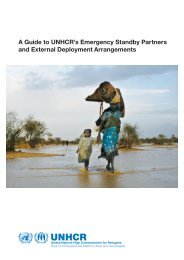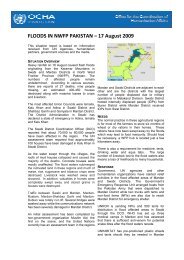Women, Girls, Boys and men - HumanitarianInfo.org
Women, Girls, Boys and men - HumanitarianInfo.org
Women, Girls, Boys and men - HumanitarianInfo.org
Create successful ePaper yourself
Turn your PDF publications into a flip-book with our unique Google optimized e-Paper software.
seekIng out voIces: unhcr’s pArtIcIpAtory prActIce In sIerrA leone<br />
how can we ensure effect ve part c pat on?<br />
Set the foundat on<br />
Participants bring information <strong>and</strong> solutions, but must<br />
also be given sufficient information or support in order to<br />
participate in a meaningful way. This is related to the ethics<br />
of participation <strong>and</strong> includes attention to:<br />
• How a request for participation is conveyed — being<br />
clear on what we are asking <strong>and</strong> why. What is the relevance<br />
to the individual or group? Why are they sought<br />
out (as young mothers, ex-combatants, perceived marginalized<br />
group)?<br />
• Empower<strong>men</strong>t <strong>and</strong> leadership — what information<br />
does the target group need (on existing issues, their<br />
rights, obligations or objectives of the humanitarian actor,<br />
role of national authorities) to help empower their<br />
participation <strong>and</strong> maximize relevance to <strong>and</strong> impact<br />
on both the participant <strong>and</strong> the humanitarian actor?<br />
<strong>Wo<strong>men</strong></strong> might require different information from <strong>men</strong>;<br />
girls from boys; adolescents from the elderly. What special<br />
support do they need to participate (e.g. advance<br />
notice for meetings; transportation; child care; mechanisms<br />
of redress)? Who determines what information<br />
<strong>and</strong> support is needed, emphasizing the importance of<br />
local knowledge?<br />
• Building trust by providing information back to the<br />
participants <strong>and</strong> the wider community. This demonstrates<br />
how the information was interpreted <strong>and</strong> applied<br />
by the humanitarian actor; how a regular mecha-<br />
I A s c g e n D e r h A n D b o o k<br />
in sierra leone, unhCr instituted a system of refugee participation in eight refugee camps to ensure that the views <strong>and</strong> concerns of all<br />
refugees were expressed to unhCr, govern<strong>men</strong>t <strong>and</strong> imple<strong>men</strong>ting partners. unhCr invited its partners to solicit refugees’ views on how<br />
they could best participate in camp manage<strong>men</strong>t. through regular discussions, it was realized that some important concerns were not being<br />
adequately addressed by the camp manage<strong>men</strong>t or unhCr staff — either because the issues were not reported or because they could not be<br />
properly addressed by camp manage<strong>men</strong>t.<br />
refugee wo<strong>men</strong> stated that most decision-making was male dominated <strong>and</strong> that husb<strong>and</strong>s collected <strong>and</strong> kept custody of household entitle<strong>men</strong>ts,<br />
including food <strong>and</strong> non-food items. a new representation system was established, comprising:<br />
• a refugee executive Committee whose members were elected through universal voting <strong>and</strong> positions were reserved for wo<strong>men</strong><br />
<strong>and</strong> youth;<br />
• a Committee of elders with advisory capacity to the refugee executive Committee, representing ethnic groups <strong>and</strong> religious denominations;<br />
• a Grievance Committee to administer justice <strong>and</strong> by-laws; <strong>and</strong><br />
• revamping of the current system through subcommittees (e.g. on child protection, sexual <strong>and</strong> gender-based violence) to monitor imple<strong>men</strong>ting<br />
partner activities <strong>and</strong> advocate for refugee welfare.<br />
the new system also facilitated wider refugee participation in camp manage<strong>men</strong>t <strong>and</strong> promoted transparency <strong>and</strong> accountability in service<br />
provision. some refugee subcommittees worked directly to address specific protection concerns. refugees were made aware of their entitle<strong>men</strong>ts<br />
<strong>and</strong> rights <strong>and</strong> further empowered to govern their own issues. While the number of wo<strong>men</strong> in the camp committee was low despite<br />
community sensitization over two years, wo<strong>men</strong> did participate in subcommittees. <strong>Wo<strong>men</strong></strong>’s participation in camp administration <strong>and</strong> other<br />
sector activities increased to 45% in most camps. the refugee executive Committee is also engaged in unhCr <strong>and</strong> partners’ planning efforts<br />
through consultations in each camp, reviewing ongoing programmes <strong>and</strong> determining future priorities.<br />
nism for feedback on results <strong>and</strong> expectations can be<br />
replicated; <strong>and</strong> shows that participants’ involve<strong>men</strong>t<br />
was meaningful <strong>and</strong> taken seriously. It is also important<br />
to verify with the wider community whether the<br />
type of participation <strong>and</strong> the selection of participants<br />
were appropriate (e.g. trusted by the community, took<br />
action such as disseminating information or raising the<br />
appropriate concerns <strong>and</strong> solutions). If done effectively,<br />
providing information back can help to encourage<br />
future participation.<br />
the 3 key InDIcAtors For pArtIcIpAtIon<br />
1. <strong>Wo<strong>men</strong></strong> <strong>and</strong> <strong>men</strong> of all ages from the disaster-affected <strong>and</strong><br />
wider local populations, including vulnerable groups, receive<br />
information about the assistance programme <strong>and</strong> are given<br />
the opportunity to com<strong>men</strong>t to the assistance agency during<br />
all stages of the project cycle.<br />
2. Written assistance programme objectives <strong>and</strong> plans should<br />
reflect the needs, concerns <strong>and</strong> values of disaster-affected<br />
people, particularly those belonging to vulnerable groups,<br />
<strong>and</strong> contribute to their protection.<br />
3. programming is designed to maximize the use of local skills<br />
<strong>and</strong> capacities.<br />
the Chapter also provides important Guidance notes on<br />
achieving the indicators through representation, communication<br />
<strong>and</strong> transparency; local capacity; <strong>and</strong> long-term sustainability.<br />
the sphere project (2004)<br />
G e n d e R A n d PA R T I C I PAT I o n I n H u m A n I T A R I A n A C T I o n<br />
PARTiciPATiOn











